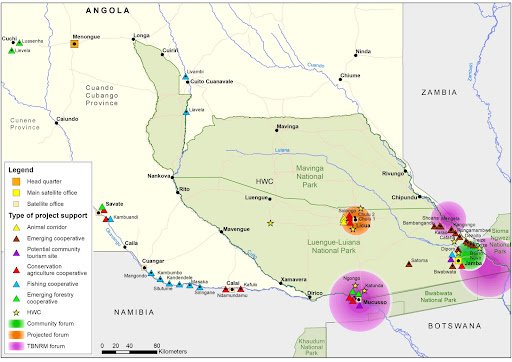ACADIR | Associação de Conservação do Ambiente e Desenvolvimento Integrado Rural
Association for the Conservation of the Environment and Integrated Rural Development
Building resilience for communities and wildlife in southeastern Angola.
The Association for the Conservation of the Environment and Integrated Rural Development (ACADIR - Associação de Conservação do Ambiente e Desenvolvimento Integrado Rural) is the first and only locally-led NGO spearheading community conservation efforts on a significant scale in southern Angola’s Cuando-Cubando province. This region is a key landscape in the Kavango–Zambezi Transfrontier Conservation Area (KAZA TFCA), one of the world’s largest transboundary conservation areas. KAZA is home to the largest contiguous population of African elephants on earth, along with a wealth of other wildlife and spectacular ecosystems, including the Okavango Delta and Victoria Falls.
With unrivaled knowledge of the region and the communities that live there, ACADIR has spent the last two decades helping the people of this remote area engage in community-based conservation efforts that improve their livelihoods and protect and restore nature. ACADIR has introduced conservation agriculture techniques, improved local fisheries management, wildlife monitoring, and river basin management, as it works to lay the basis for communities in this region to manage and benefit from their natural resources. This work is supporting some of southern Africa’s most marginalized communities, while also playing a key role in conserving one of Africa’s most critical ecosystems.
Laying the Groundwork for CBNRM in Angola
ACADIR’s unique capacity and field experience has helped it become known and respected by both government agencies and local communities, as well as many NGO partners, positioning it as the focal NGO for engaging on community natural resource management issues within the Angolan portion of KAZA.
Conservation agriculture
ACADIR helped over 750 farmers from 11 villages to increase certain crop yields by 87%, improving nutrition and increasing direct income to families living in and around the Luengue Luiana Park.
Recovering wildlife
Conservation benefits are bringing more tolerance for coexistence with wildlife. Recently, 12 herds of elephants have reportedly been observed in the Luengue Luiana National Park, an all-time high in the past five years.
Improving local fishing practices
Improved fishing practices brought fish catches from from an average catch of 3 kg/day to 12kg/day.
The Cuando-Cubando Province contains a vast river network, with many rural communities dependent on fish for livelihoods and income in this remote area. ACADIR has worked with communities living around the Okavango river, who were catching fewer and fewer fish as a result of depleted stocks in the river resulting from overfishing. The communities formed legally recognized fishing cooperatives, which adopted seasonal fishing practices allowing fish populations more time to recover. With trained community monitors, seasonal fishing practices, and required fishing licenses, fishing has vastly improved from an average catch of 3 kg/day to 12kg/day.







